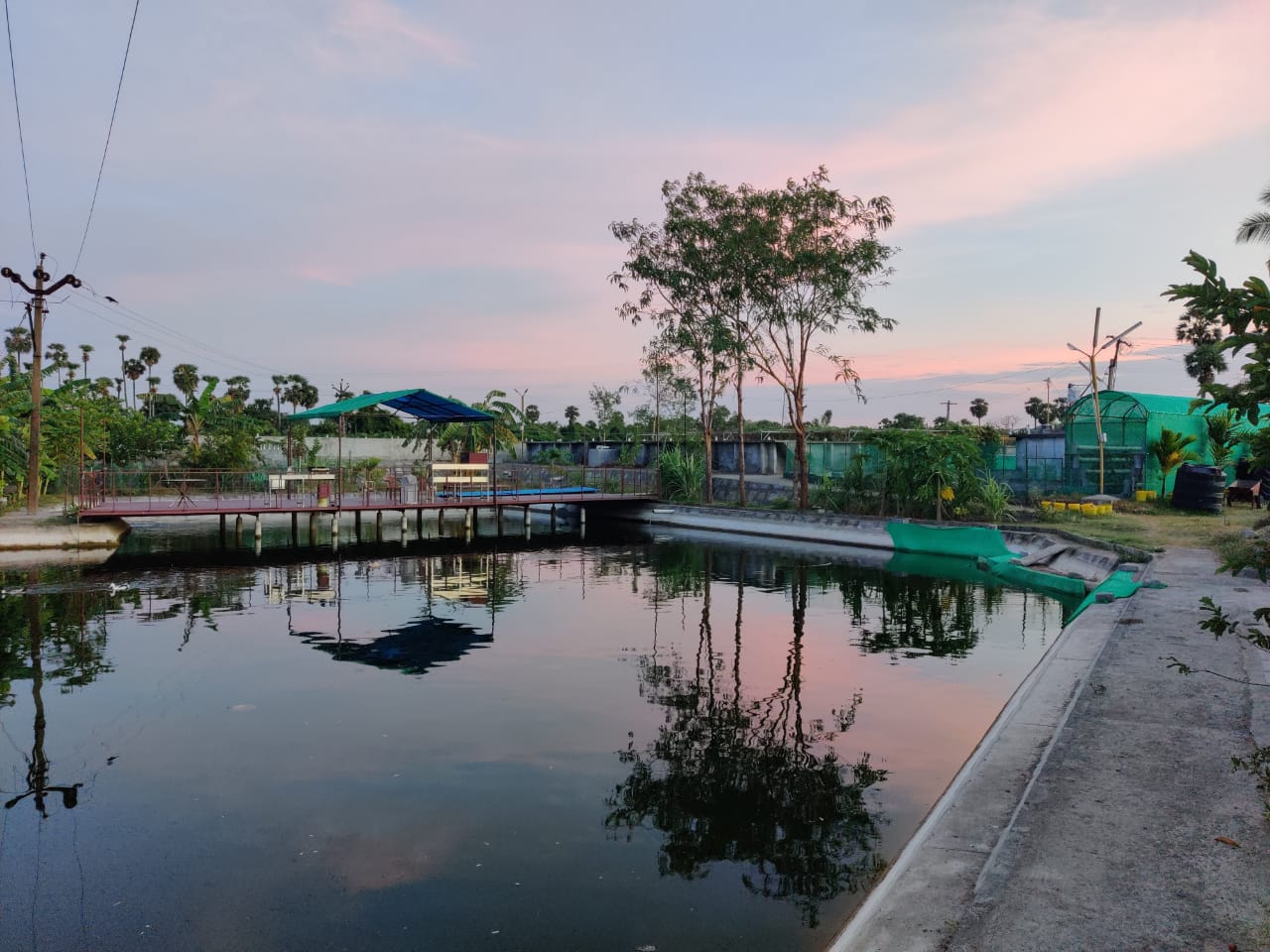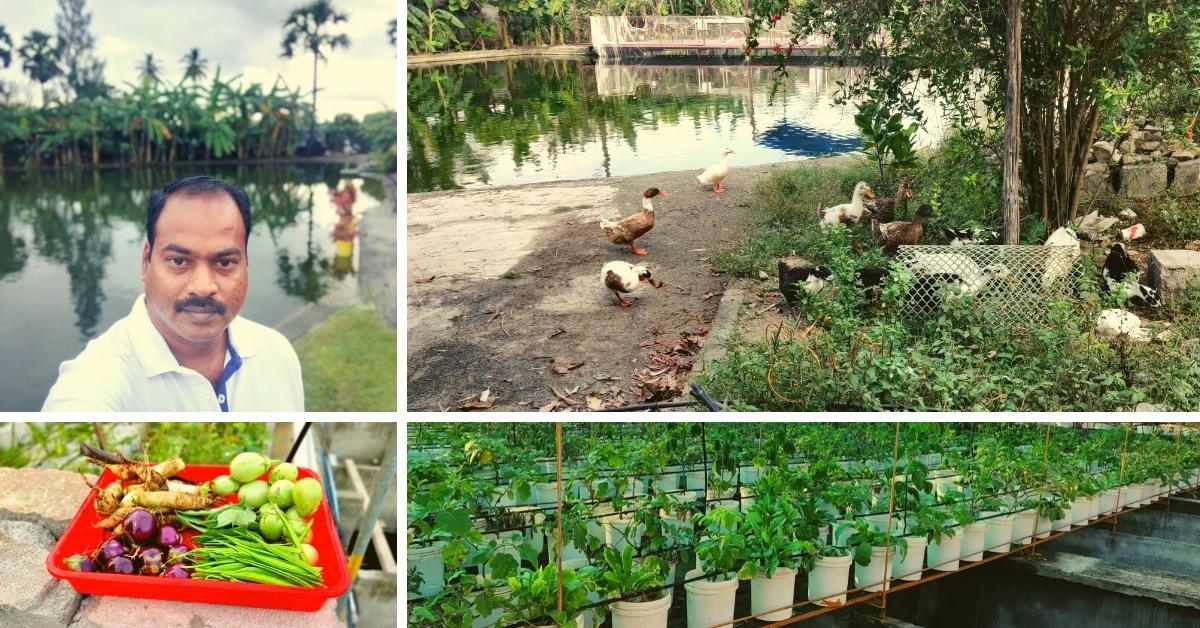Editor’s Note: Due to the overwhelming number of enquires we are receiving, we wish to clarify that due to the ongoing COVID-19 crisis, farm visits and training sessions will only resume after March 2021.
A small, lush plot of land in Chengalpet, a town 76 kilometres away from Chennai, Tamil Nadu, is the face of the future of farming. The integrated hydroponics and fish farm was created by Jegan Vincent, a software engineer who quit his job in the US and returned to India with the goal of doing something more meaningful with aquaponics.
He bought an acre of land and started Freshry Farms five years ago in order to experiment with efficient and eco-friendly farming techniques. The result was an aquaponics farm. Aquaponics refers to an integration of aquaculture such as pisciculture with hydroponics, i.e. cultivating plants in water.
Recently, he made his farm open to researchers from universities and colleges. He also runs a free three-day course for anyone interested in modern organic farming and pisciculture. Besides teaching, he supports the local farmers by providing them with tree saplings for free, making his dream farm holistic in every sense of the word.
Unable to view the above button? Click here
“My aim is to see if we can generate as much produce on an acre of land as is conventionally possible on 7 acres,” Jegan tells The Better India. The farm currently yields 45 tonnes of fish every year and 3 to 4 tonnes of vegetables every month. He has been able to achieve this by developing a cohesive farming system.

Building A Wholesome Farm
The aquaponics farm consists of a central 40-lakh-litre reservoir in which plants are grown in water, without soil. A stone-metal grid supports the plants.
“People tend to think plants need soil,” Jegan explains, adding, “But the main function of the soil is to provide support. Nutrients can be absorbed by the roots from water or surrounding air.”
Connected to the water reservoir are 30 to 40 tanks in which fish are cultivated. The fish feed and fish waste enrich the water with nutrients. In turn, the plants oxygenate and cleanse the water. With the help of a large motor, the water circulates through the whole system, replenishing itself.
His engineering background helped with automating several processes such as water-level regulation and nutrient-content monitoring.
“And no artificial fertilizers or pesticides are used anywhere on the aquaponics farm,” Jegan points out.
Initially, he experimented with 80 different varieties of vegetables before narrowing it down to a few that worked best. Now he grows tomatoes, brinjal, hot chilli, and ivy gourd, locally known as kovakkai.
On small islands scattered across the mini water-world, there are also hundreds of tropical trees like banana and papaya and many sugarcane patches. The roots of these plants help absorb excess nitrates.
There are nine varieties of fish, the main one being Tilapia. Besides fish and plants, hens, ducks, sheep, rabbits, and other small animals thrive on Jegan’s farm.
Why Aquaponics?
The initial cost of setting up a farm like Freshry Farms is very high – around Rs 20 to 25 lakhs for an acre. And five years later, Jegan is just about breaking even. But he believes that developing new agricultural methodologies is essential for a sustainable future.
An integrated and holistic ecosystem is many times more efficient than a traditional farm. For instance, Jegan’s farm needs only a fifth of the water a traditional farm needs. Moreover, techniques like aquaponics and hydroponics are the backbone of vertical gardens and farming.
Read More: 70-YO Madurai Man Grows 20+ Fruits & Vegetables On His ‘Floating’ Terrace Farm!
“Within the next 10 years, we should have large vertical farms in the middle of cities, even as a part of malls and buildings,” Jegan says, describing his hope for the future. It simultaneously solves the problems of space and logistics.
“Even though my farm was expensive to set up, there are much cheaper ways of setting up smaller aquaponic and hydroponic farms,” he adds. In places where water and fertile soil are scarce, such farms will be economically and ecologically beneficial.
To share his findings with the world and to encourage more research in the field, Jegan has tied up with four universities in Tamil Nadu and two in Africa. Many students and researchers from India and around the world visit the aquaponics farm every year.
Dr Kayalvizhi Jayavel is an engineering professor at SRM College, Chennai, with an interest in IoT systems. She had visited the aquaponics farm two years ago to learn more about automation and IoT in an agricultural context.
“It was altogether a different experience,” says Dr Jayavel of the training, adding, “It was a new culture by itself where you educate yourself technically, still being environmentally connected. We used to collect fresh veggies from the farm to cook, the best way to relax after each day’s training. In a nutshell, it was a very insightful and knowledge-building experience.”
(Edited by Yohita Rao)
We bring stories straight from the heart of India, to inspire millions and create a wave of impact. Our positive movement is growing bigger everyday, and we would love for you to join it.
Please contribute whatever you can, every little penny helps our team in bringing you more stories that support dreams and spread hope.

